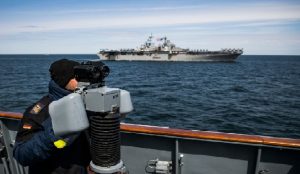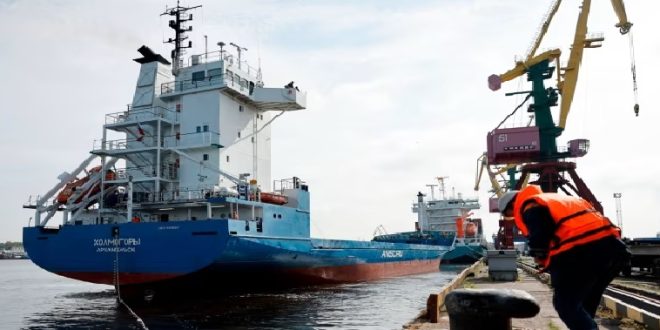24-05-2024
TALLINN/ RIGA/ VILNIUS: There have been calls for calm in Finland and the Baltic States after a draft Russian decree proposed revising its borders in the Baltic Sea.
Latvia said it was trying to clarify the situation, but Lithuania warned that the Kremlin was aiming to intimidate its neighbors with a “deliberate, targeted escalatory provocation”.
 Finnish President Alexander Stubb said political leaders were watching the situation closely and Helsinki “acts as always: calmly and based on facts”.
Finnish President Alexander Stubb said political leaders were watching the situation closely and Helsinki “acts as always: calmly and based on facts”.
The draft Russian defence ministry decree suggested moving the sea borders around Russian islands in the Gulf of Finland and around the exclave of Kaliningrad.
The decree was first highlighted on Tuesday, when Russia’s Tass news agency and other media reported on its proposal to redraw old borders dating back to the Soviet era in January 1985.
It was not immediately clear if the draft proposed extending its borders into Finnish waters in the Baltic or Lithuanian waters near Kaliningrad. However, it would have included territory in the eastern Gulf of Finland, several islands close to the Finnish coast and areas near the two cities of Baltiysk and Zelenogradsk in Kaliningrad.
Finland and the Baltic states are all members of the EU and NATO and the military alliance is committed to defending their borders.
Finland’s defence and foreign committees held emergency meetings on Wednesday and Prime Minister Petteri Orpo said the political leadership was “monitoring the situation closely”.
“Right now I don’t see any reason for greater concern,” he said.
The Russian proposals were no longer visible on Wednesday with only the message “draft deleted” remaining on the page. A Russian source later told Tass and other news agencies there were no plans to revise Russia’s territorial waters in the Baltic.
 Kremlin spokesman Dmitry Peskov referred all enquiries to the defence ministry, pointing out that “there is nothing political here”, while making the point that the political situation had changed since the 1980s: “You can see the level of confrontation, especially in the Baltic region.”
Kremlin spokesman Dmitry Peskov referred all enquiries to the defence ministry, pointing out that “there is nothing political here”, while making the point that the political situation had changed since the 1980s: “You can see the level of confrontation, especially in the Baltic region.”
Charly Salonius-Pasternak of the Finnish Institute of International Affairs said the Russian plan was clearly trying to appear as a bureaucratic, technical exercise but it was also a very typical Russian approach of “probe everywhere and then if you get pushback, say it was nothing”.
Lithuania’s Foreign Minister Gabrielius Landsbergis said on X that it was “an obvious escalation against NATO and the EU and must be met with an appropriately firm response”.
The Russian revelations also coincided with a call for vigilance from Sweden’s armed forces chief, Gen Micael Byden.
“Putin’s goal is to gain control of the Baltic Sea,” he told Germany’s RND website. “The Baltic Sea must not become Putin’s playground where he can strike fear into NATO members.”
Sweden joined NATO in March, becoming the alliance’s 32nd member, and it has beefed up its military presence on the Baltic island of Gotland in the past two years.
Gen Byden said he was sure Russia had its eyes on Gotland, because if Sweden lost control of the island it would mean an end to peace and stability in the Nordic and Baltic regions.
Finland, which joined NATO last year, has announced plans to prevent asylum seekers crossing its eastern border with Russia in large numbers.
Helsinki fears Moscow has plans to “instrumentalise” migration, however the UN refugee agency has warned that the draft law could result in so-called pushbacks of people with a legitimate right to asylum. (Int’l Monitoring Desk)
 Pressmediaofindia
Pressmediaofindia




